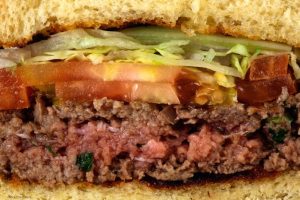A report issued by the Public Health Protection Unit, NHS Greater Glasgow and Clyde concludes that an E. coli outbreak that sickened 22 people at the SEE Hydro concert earlier this year was caused by undercooked beef burgers. Twenty-two people were sickened with E. coli O157 during this outbreak. Three people were hospitalized. Nineteen of those sickened attended the venue and ate beef burgers; the other three secondary cases were household contacts of those people.
 The report concludes “there is strong epidemiological evidence pointing to the exposure being the consumption of beef burgers purchased from the Big Grill at the SEE Hydro between January 17 and January 19.” There were no other notified cases of E. coli O157 phage type 13 in Scotland at the time of this outbreak.
The report concludes “there is strong epidemiological evidence pointing to the exposure being the consumption of beef burgers purchased from the Big Grill at the SEE Hydro between January 17 and January 19.” There were no other notified cases of E. coli O157 phage type 13 in Scotland at the time of this outbreak.
Nineteen of the 22 cases were male. The confirmed cases ranged in age from 9 to 61 years. None of those sickened had serious complications from their illnesses.
All beef burgers had been consumed or discarded by the time the outbreak came to the attention of public health official so could not be tested for the pathogenic bacteria. An investigation by environmental health officials suggests “the possibility of processing errors leading to undercooking as well as the potential for cross contamination in the preparation and serving of the beef burger products.”
Those processing errors include lack of consistency in cooking, inadequacy of temperature monitoring records, weakness in temperature monitoring techniques, inappropriate cleaning and disinfecting of the kitchen, and absence of documented evidence of a hazard analysis in relation to the two-step cooking process.
In other words, the burgers were seared in a central processing kitchen, cooled, then kept in chilled storage, which is a risk for bacterial growth. The burgers all had different appearances at this stage; some were well seared, and others were barely cooked. The burgers were then cooked to order in a high demand setting, which is risky since testing every burger with a food thermometer usually isn’t done under these circumstances.
Partially cooking meat, then cooling it and finishing cooking at a later time can trigger bacterial growth, especially since the food goes through the “danger zone” of 40°F to 140°F twice. In addition, the burgers were periodically tested with a food thermometer while on the grill, which could lead to overestimation of the temperature.
The report concludes that this outbreak should be used to highlight the risks associated with undercooked ground beef products. And officials recommend that the two part process of cooking beef burgers should be publicized as being risky.




